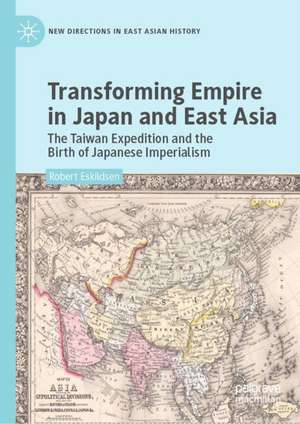Transforming Empire in Japan and East Asia: The Taiwan Expedition and the Birth of Japanese Imperialism: New Directions in East Asian History
Autor Robert Eskildsenen Limba Engleză Hardback – 16 ian 2019
This book examines the history of a military expedition the Japanese government sent to southern Taiwan in 1874, in the context of Japan’s subordination to Western powers in the unequal treaty system in East Asia. It argues that events on the ground in Taiwan show the Japanese government intended to establish colonies in southern and eastern Taiwan, and justified its colonial intent based on the argument that a state must spread civilization and political authority to territories where it claimed sovereignty, thereby challenging Chinese authority in East Asia and consolidating its power domestically. The book considers the history of the Taiwan Expedition in the light of how Japanese imperialism began: it emerged as part of the process of consolidating government power after the Meiji Restoration, it derived from Western imperialism, it developed in a dynamic relationship with Western imperialism and it increased Japan’s leverage in its competition for influence in East Asia.
Preț: 704.50 lei
Preț vechi: 828.82 lei
-15% Nou
Puncte Express: 1057
Preț estimativ în valută:
134.85€ • 146.52$ • 113.35£
134.85€ • 146.52$ • 113.35£
Carte tipărită la comandă
Livrare economică 21 aprilie-05 mai
Preluare comenzi: 021 569.72.76
Specificații
ISBN-13: 9789811334795
ISBN-10: 981133479X
Pagini: 529
Ilustrații: XIX, 383 p. 21 illus.
Dimensiuni: 148 x 210 x 24 mm
Greutate: 0.63 kg
Ediția:1st ed. 2019
Editura: Springer Nature Singapore
Colecția Palgrave Macmillan
Seria New Directions in East Asian History
Locul publicării:Singapore, Singapore
ISBN-10: 981133479X
Pagini: 529
Ilustrații: XIX, 383 p. 21 illus.
Dimensiuni: 148 x 210 x 24 mm
Greutate: 0.63 kg
Ediția:1st ed. 2019
Editura: Springer Nature Singapore
Colecția Palgrave Macmillan
Seria New Directions in East Asian History
Locul publicării:Singapore, Singapore
Cuprins
Introduction.- Part I: The regional context of the Taiwan Expedition.- From portals to borders.- A justification for colonization.- Planning an expedition to Taiwan.- The decision to go to Taiwan.- Part II: On the ground in Taiwan.- Spies and explorers.- Punishing the “savages”.- The fading dream of colonization.- Part III: Defending the expedition.- Negotiating a settlement.- Justifying the expedition in the Japanese media.- Conclusion.
Recenzii
“Efforts to understand the peculiarities of Japanese imperialism remain important to scholars of Japan and comparative history alike, and Eskildsen makes a significant contribution in that respect … . His study opens a revealing window onto early Meiji political and cultural history in its regional environment as well as onto the multilayered workings of international relations in East Asia.” (Yoshihisa Tak Matsusaka, Monumenta Nipponica, Vol. 75 (1), 2020)
Notă biografică
Robert Eskildsen is Senior Associate Professor, Department of History, International Christian University, Japan. The author's academic training is in the field of modern Japanese history, notably in the sub-fields of premodern Japanese history and modern East Asian history. His publications on the topic include articles in leading journals of history and Asian Studies, such as the American Historical Review and The Journal of Asian Studies.
Textul de pe ultima copertă
This book examines the history of a military expedition the Japanese government sent to southern Taiwan in 1874, in the context of Japan’s subordination to Western powers in the unequal treaty system in East Asia. It argues that events on the ground in Taiwan show the Japanese government intended to establish colonies in southern and eastern Taiwan, and justified its colonial intent based on the argument that a state must spread civilization and political authority to territories where it claimed sovereignty, thereby challenging Chinese authority in East Asia and consolidating its power domestically. The book considers the history of the Taiwan Expedition in the light of how Japanese imperialism began: it emerged as part of the process of consolidating government power after the Meiji Restoration, it derived from Western imperialism, it developed in a dynamic relationship with Western imperialism and it increased Japan’s leverage in its competition for influence inEast Asia.
Caracteristici
Examines the history of a military expedition the Japanese government sent to southern Taiwan in 1874 Explores the Japanese government's colonial intent, and its justification that a state must spread civilization and political authority to territories where it claimed sovereignty, thereby challenging Chinese authority in East Asia and consolidating its power domestically. Considers the origins of Japanese imperialism as emerging as part of the process of consolidating government power after the Meiji Restoration in a dynamic relationship with Western imperialism










